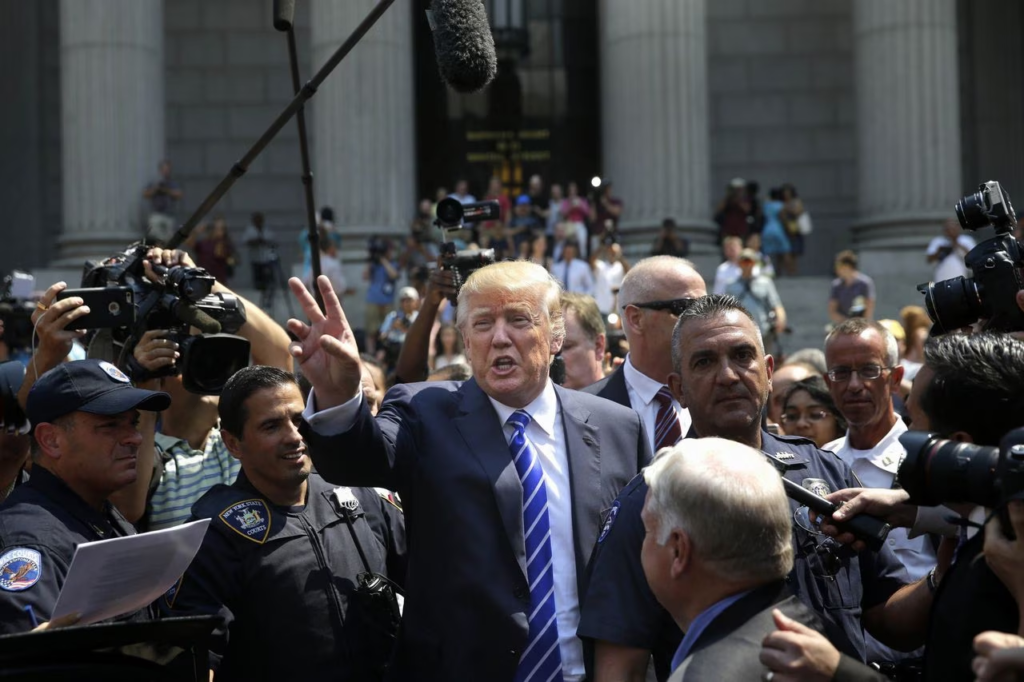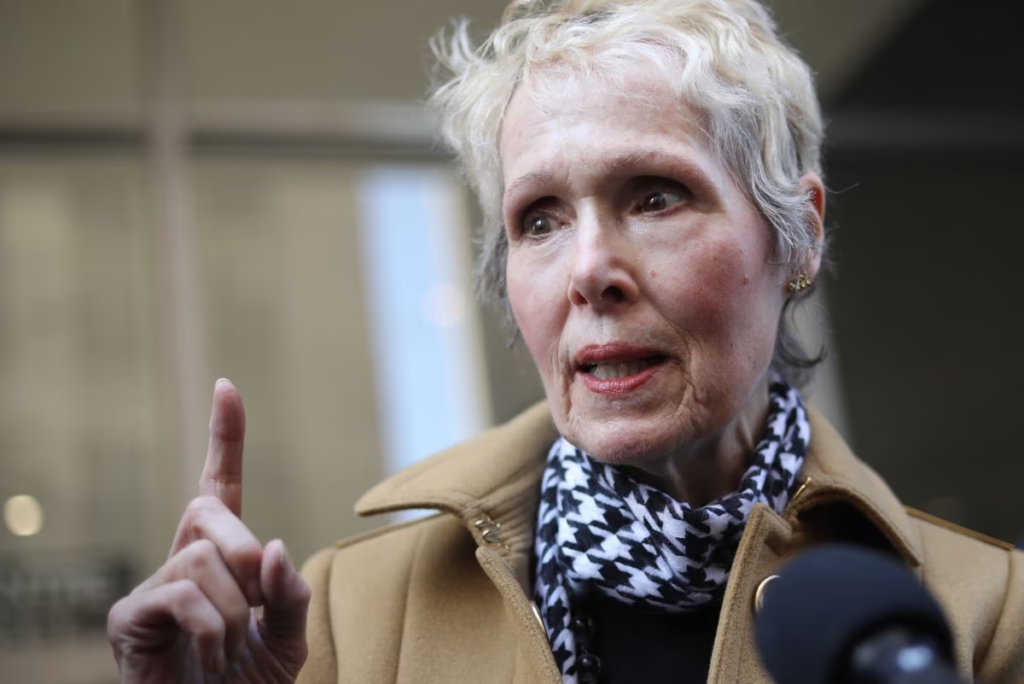E. Jean Carroll received a $5 million settlement for battery and defamation after a federal jury in Manhattan found that Donald Trump had sexually assaulted her in the spring of 1996 in a changing room at a high-end department shop.

Carroll claimed Trump sexually assaulted her in the Bergdorf Goodman department shop. After he disputed her claim, claimed she wasn’t his type, and implied she made up the incident to increase book sales, Trump defamed Carroll. All misconduct was refuted by Trump.
The civil judgment spares him from serving any jail time.Carroll failed to convince the jury that Trump had raped her, even though the jury determined that Trump had sexually assaulted her, which was enough to hold him accountable for battery.Under the “New York State Adult Survivors Act,” a state law that established a look-back window for sexual assault claims like Carroll’s with long-expired statutes of limitations, Carroll filed the complaint last November.
Trump stayed away from the trial. He did not have to show up in court for the trial or any further hearings, and he had the same right not to testify in his own defense as any other defendant in a civil action.
Carroll hailed the decision as a win for her and other abused individuals.She stated in a statement, “I filed this lawsuit against Donald Trump to clear my name and to get my life back.” “Today, the truth is finally known by everyone. This victory belongs to all women who have endured suffering as a result of being disbelieved, not just to me.
No one is above the law, not even a former President of the United States, according to Carroll’s primary attorney Roberta Kaplan, who also issued a statement.
Trump announced his intention to appeal the decision in videos released to his social media platform Truth Social on Tuesday night, labeling it a “disgrace” and “political witch hunt.” He also reiterated his denial that he was familiar with Carroll.
Outside of court on Tuesday, Trump’s attorney Joe Tacopina claimed to have spoken with the former president, who is “ready to proceed and go forward.”

He is adamant, as are many others, that the jury pool in New York City will prevent him from receiving a fair trial, Tacopina said.Jurors are asked not to reveal their identities
Following the verdict, Judge Lewis Kaplan (who is not related to the plaintiff’s counsel, Roberta Kaplan), discharged the jury and advised them they may now chose to reveal their identities publicly. The judge, however, advised that they keep quiet.
“I suggest that you refrain from identifying yourselves. Lewis Kaplan declared, “Not now and not for a very long time. “I command you not to identify anyone else who served on this jury if you choose to speak to others and identify yourself to others. Whatever you determined for yourselves, each of you owes the other that.
Carroll clung to Shawn Crowley, her attorney, as the verdict was announced. She seemed to bounce forward and gave off a relieved look. As the clerk read out each of the counts in her favor, they smiled at one another.
Following the jury’s deliberations, Trump’s attorney Tacopina approached Carroll and shook her hand. He also shook hands with her legal representatives.
Carroll and Roberta Kaplan, her lead attorney, embraced shoulders. Together they left.
Carroll’s statement
Last week, Carroll gave harrowing details about what occurred in 1996 while appearing on the witness stand.
Carroll stated, “I’m here because Donald Trump sexually assaulted me and denied it when I wrote about it. “I’m here to try to get my life back,” the defendant said. “He lied and destroyed my reputation.”Carroll admitted in court that she is a registered Democrat and that she believes Trump is “evil” and “vile” and was a terrible president, but she insisted that her political opinions had nothing to do with the litigation she is pursuing.
Carroll declared, “I’m not settling a political score. “I’m settling a personal score since he continuously called me a liar, which seriously damaged my reputation. As a journalist, the only thing I need is the confidence of my audience.
Michael Ferrara, Carroll’s lawyer, questioned Carroll about why she kept her accusations quiet during Trump’s first presidential campaign.
“I noticed that the more women who came forward to accuse him, the better he did in the polls,” she remarked.
In his cross-examination, Tacopina inquired frequently about Carroll’s lack of screams during the roughly three-minute purported attack.
Carroll answered, “I’m not a screamer. “I was in too much of a panic to scream.”

She informed the defense attorney, “You can’t beat me up for not screaming.” “Women who choose not to come forward do so for a variety of reasons, one of which being the question of why they did not scream. While some women scream, others do not. Women are silenced as a result.Tacopina acknowledged that Trump is a controversial figure in his closing argument on Monday, but insisted that this shouldn’t influence the jury’s decision.
The public feels really strongly about Donald Trump. It should be clear,” Tacopina added. “During an election, there is a time and a place where you can do that in secrecy.”
They want you to despise him so much that you choose to disregard the truth, Tacopina continued. “Every piece of verifiable evidence is against her.”
Carroll’s rape was not found to be proven by the jury.
The jury concluded that Carroll had provided evidence of Trump’s sexual abuse even if it did not decide that Carroll had established rape.
The jury had been told that engaging in sexual contact with another individual without that person’s consent constitutes sexual abuse.
According to New York law, “sexual contact” is defined as “any touching of a person’s sexual or other intimate parts for the purpose of gratifying the sexual desire of either party.”
According to state law, forcing sexual contact on another individual without that person’s permission constitutes rape. The term “sexual intercourse” as used in this statute refers to “any penetration, however slight, of the penis into the vaginal opening.”
In New York, rape and sexual assault both constitute sexual offenses.
The verdict has no bearing on Trump’s eligibility to seek the presidency.
Trump’s presidential campaign won’t be affected by the ruling in any way legally. For starters, it is a civil matter, and during the 2016 campaign, Trump also dealt with a variety of civil actions, such as the Trump University fraud allegations that were quickly resolved after he was elected, that had nothing to do with the constitutionally mandated qualifications for the presidency.
The case that Manhattan prosecutors have brought against Trump for hush money payments to adult film star Stormy Daniels, who alleged they had an extramarital affair (Trump denies the accusation), is the most notable example of Trump’s vulnerability to unrelated criminal charges.
A successful criminal prosecution of the former president is unlikely to have an impact on his chances of winning reelection, at least from a legal sense.
Notably, there is precedent for criminals with a criminal record to compete for federal office, including the presidency. Eugene V. Debs, a socialist who ran repeatedly for president in the early 20th century, was imprisoned for espionage when he garnered more than 900,000 votes in the 1920 election.




